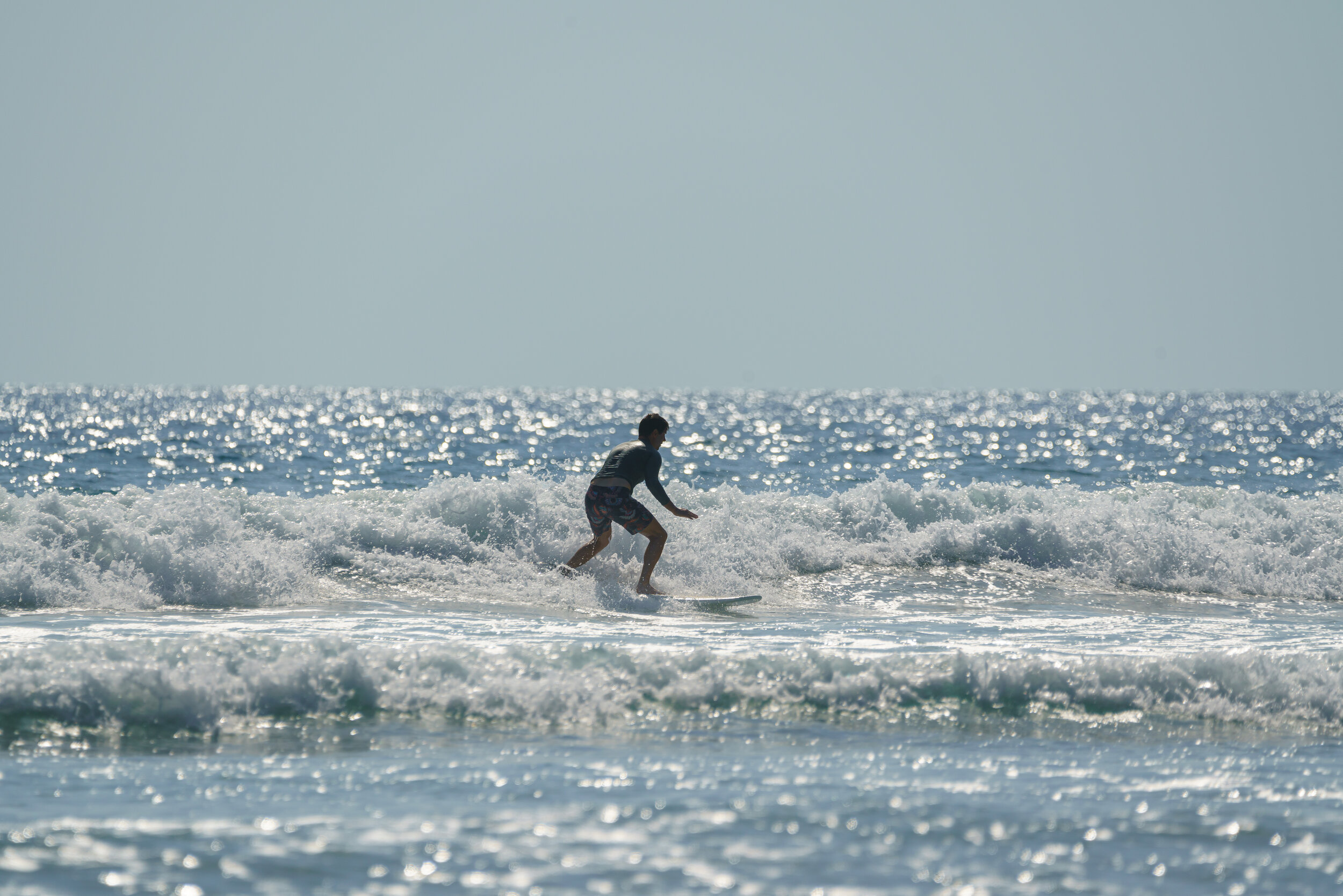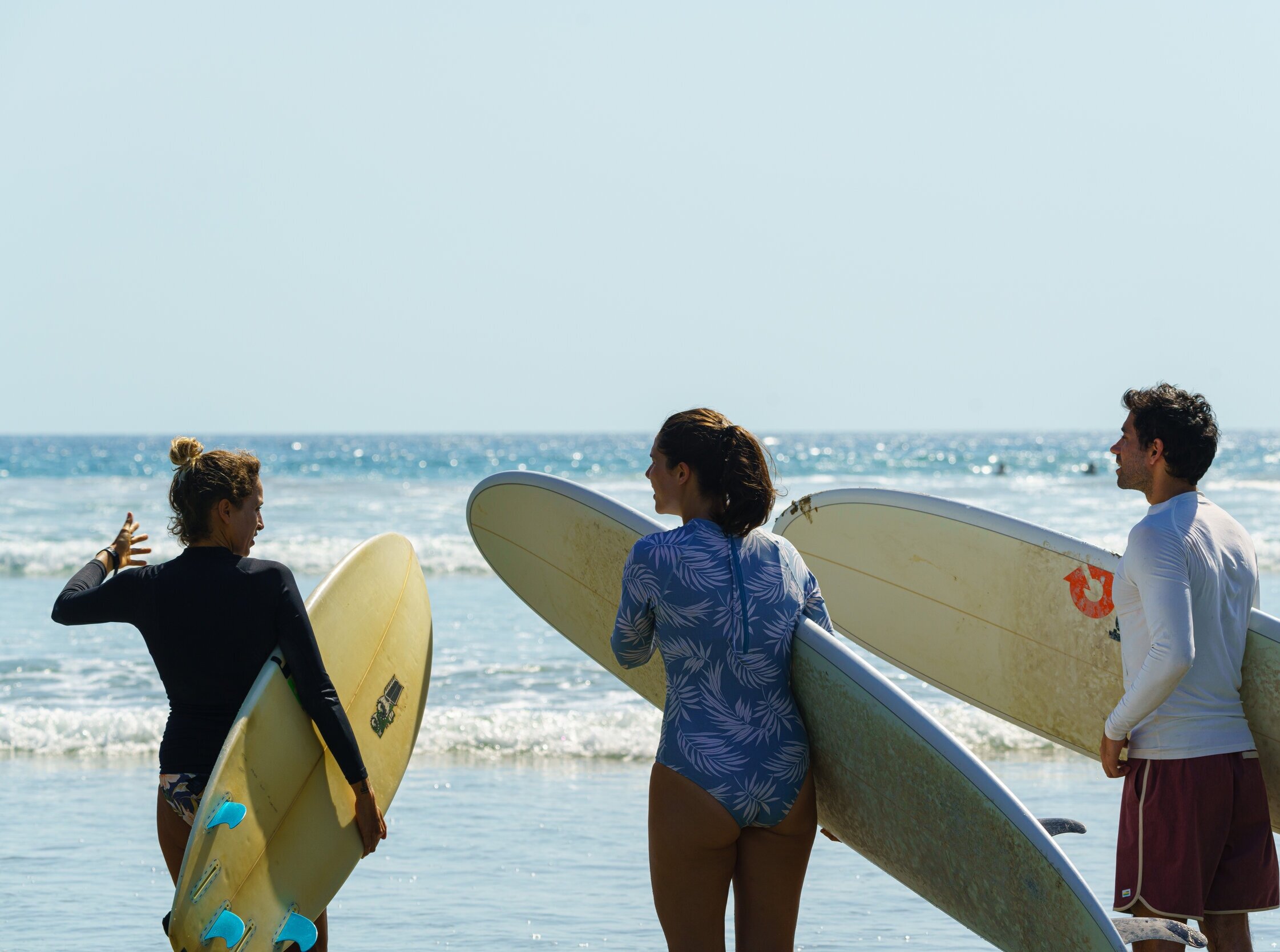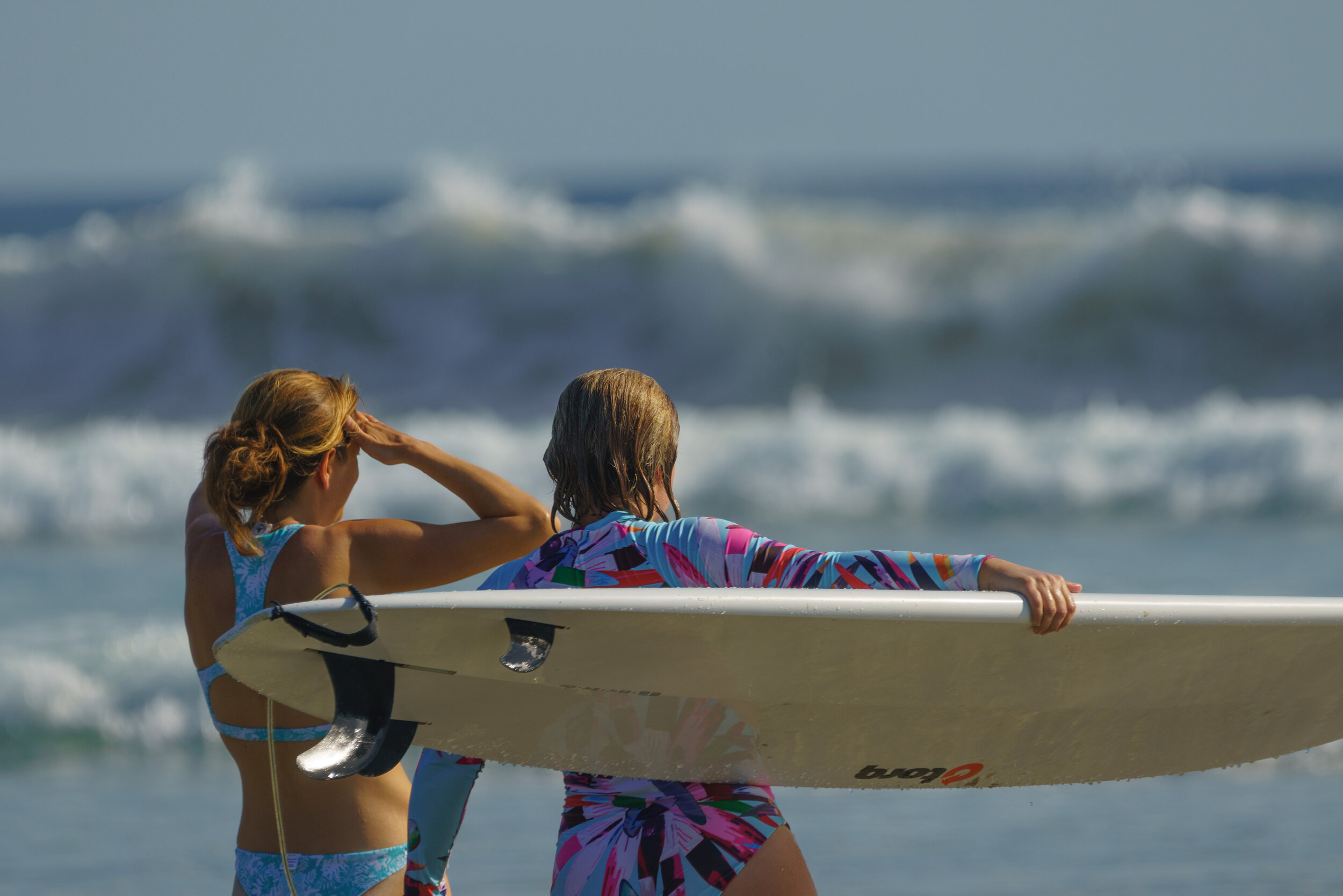What to consider as a first-time wave rider
Have you found yourself daydreaming of a tropical vacation? Perhaps one that challenges you mentally and physically daily while providing you with that exhilarating rush you've been longing for. Whether you've been contemplating surfing for a long time or the idea has just popped up on your radar, we've got some pointers that might help.
Surfing for the first time can seem daunting, and sometimes even scary, but with the right information, attitude towards learning, and preparation you'll be headed to the waves in no time.
We've compiled a list (in no particular order) of 14 key points that we find helpful for the beginner surfer:
Before hitting the water
1. Do some research
The biggest fears beginner surfers face comes from the unknown: the unknown of what the ocean will provide, and whether or not they'll be successful at the sport. With the advent of online learning and mass information, it could seem appealing to teach yourself to surf, but the reality is that it will all become overwhelming quite quickly. Instead, do your research and learn about the basics of surfing including board handling, safety, and the "pop up" before actually putting them into practice. Secondly, spend some time researching reputable surf instructors, surf retreats, or surf camps with a high standard of coaching. cough cough.
2. Trust the pros
Not all places are created equal, so thankfully, you did some prior research. Perhaps you’ve decided on a surf camp in Costa Rica, or a surf & yoga retreat with great reviews. Trust that these individuals will help in getting you started in the world of surfing in the safest, most professional way possible.
3. Take advantage of your "pre-trip" time
We're not going to sugarcoat things, surfing isn't an easy sport. Those who think the ocean will do all the work are quickly humbled. That being said, there's no need to fret. All good things are worth the effort and WE PROMISE that you’ll be rewarded! Like anything in life, the more prepare, the better your chances of success. Do you need to run 30 miles a day or hit the gym 5 days a week? Probably not, but why not change up the couch routine a bit? Even the most basic strength training, HIIT classes, cardio, and swimming laps can have a huge impact on your progression. Plus, who doesn't like feeling a little more fit in their daily lives?
4. Choose your location wisely
Much like other sports, some locations will appeal to the beginner and intermediate crowd more than the seasoned pro. Just because a surf school or surf & yoga retreat offer coaching doesn't mean the conditions are favourable to the beginner. You've got enough to think about during those first few sessions, so why not take the stress of difficult conditions out of the mix. Choose a location that is best suited to the beginner/intermediate, and if you're unsure reach out to your place of choice. Ask what the beach they're located at offers and if different times of the year provide different conditions. In Costa Rica, Playa Hermosa and Santa Teresa offer great yearly conditions with access to waves for varying levels.
5. Choose the right equipment
Not all surfboards are created for all waves, much like you wouldn't use your 9 iron to putt at golf. Of course, as a beginner surfer how would you know what to use? The short answer is you wouldn't. The advice of your trusted coach should be your guiding light.
In the beginning stages volume is your friend. A bigger board with more volume (more floatation) will always be easier, and allow you to master the proper technique before dropping in board size. If your surf instructor wants to teach you on a shortboard (as a complete beginner) we suggest looking for someone different.
At the beach
6. Master the basics
Like anything, practice makes perfect. A reputable instructor will take the time to explain elements of the surfboard, water safety, and proper technique including the "functional stance". The more you practice these things on land, the more you'll flourish once in the water!
7. Ask questions freely
It’s easy to become overwhelmed. There's a lot to take in, and that's without the waves crashing around you, but fear not, your coach is there to take away these jitters. We've found that the "fear of the unknown" is usually one of the most prevalent. So ask questions, even if you think they might sound silly. The more you know, the more confident you'll feel. It's a win-win all around.
8. Pay attention to the ocean
Sometimes the best lessons are those obtain through observation. Simply watching the ocean can be a lesson in itself. Especially once you've completed a few coaching sessions and want to venture away from surf camp on your own for practice. Before jumping in, pay attention to what's happening. Have the tides changed? Are there visible dangers to be aware of? Which directions the current moving? Where are other surfers entering the water and practising? These things can provide a wealth of information to the beginner and experienced surfer alike.
Stepping foot in the big blue
9. Allow yourself to relax
Learning to surf should be a journey, one that won't happen overnight, so be easy on yourself. You've just absorbed a lot of info and may have a mind that's running wild. Just remember to breathe. Surfing should be approached in a manageable manner. Small goal-sets as opposed to an "all or nothing" mindset. Approaching learning in this way will definitely allow you to relax and enjoy the process.
10. Set realistic goals for yourself
Yes, we're human too, and as humans, we have the desire to excel at everything we do. We truly believe that setting realistic goals will make the process much more achievable and fun! Whether that's an overall goal for your surfing or daily targets you set for each lesson. Approaching surfing in this way will allow you to focus on key components each day and work towards perfecting them. The end result will be many small goals that have been mastered, blending together for very technically sound surfing.
11. Tackle frustration positively
Frustration is sometimes inevitable, despite how fun and carefree the activity we're doing may be. Just realize that like many other sports, surfing can just as easily be a mental sport. Our best advice is that instead of allowing yourself to get frustrated when things aren't going to plan, choose to use that energy for the positive. Maybe take that moment to head out of the water and take a breath. Better yet, use it to do a few on land pop-ups! Sometimes the simple act of breaking out of our mindset will create the shift towards better improvement.
12. Listen to your body
We're all created differently and that's a beautiful thing. It's easy to get wrapped up in the excitement of the surf session and want to push through exhaustion. We've seen this on countless occasions, usually ending in silly mistakes that wouldn't typically happen. At the end of the day, you're there to have fun and learn a new sport that you can hopefully keep practising until you're old and grey. Don't worry about what everyone else is doing. Rather, pay attention to your body. If you're feeling depleted allow yourself to take a step away for a few minutes to recharge. You'll be thankful you did!
13. Embrace the wipeout
You read that right. We want you to embrace wiping out. With every good surf session comes a few equally great wipeouts, it's just part of the game. There's no need to worry though, at the end of the day you’re in the ocean. All the best surf retreats will have knowledgeable coaches who will guide you through the process of a safe wipeout, and what you can expect. You'll soon learn to embrace the previously dreaded wipeout. Heck, you'll probably even fall in love with them.
14. Enjoy the moment
You've researched, planned, prepared physically and mentally, and now you're doing what you've always wanted to: SURFING. Enjoy the moment, surfing will change your life. We know it changed ours.
This is just a snippet of useful information that we hope addresses some of your concerns as a beginner surfer and awakens your desire to hit the waves. Book your very own surf trip and become the surfer you've dreamt of.
Have other thoughts or questions? Leave us a note in the comments section — we love talking surf.





